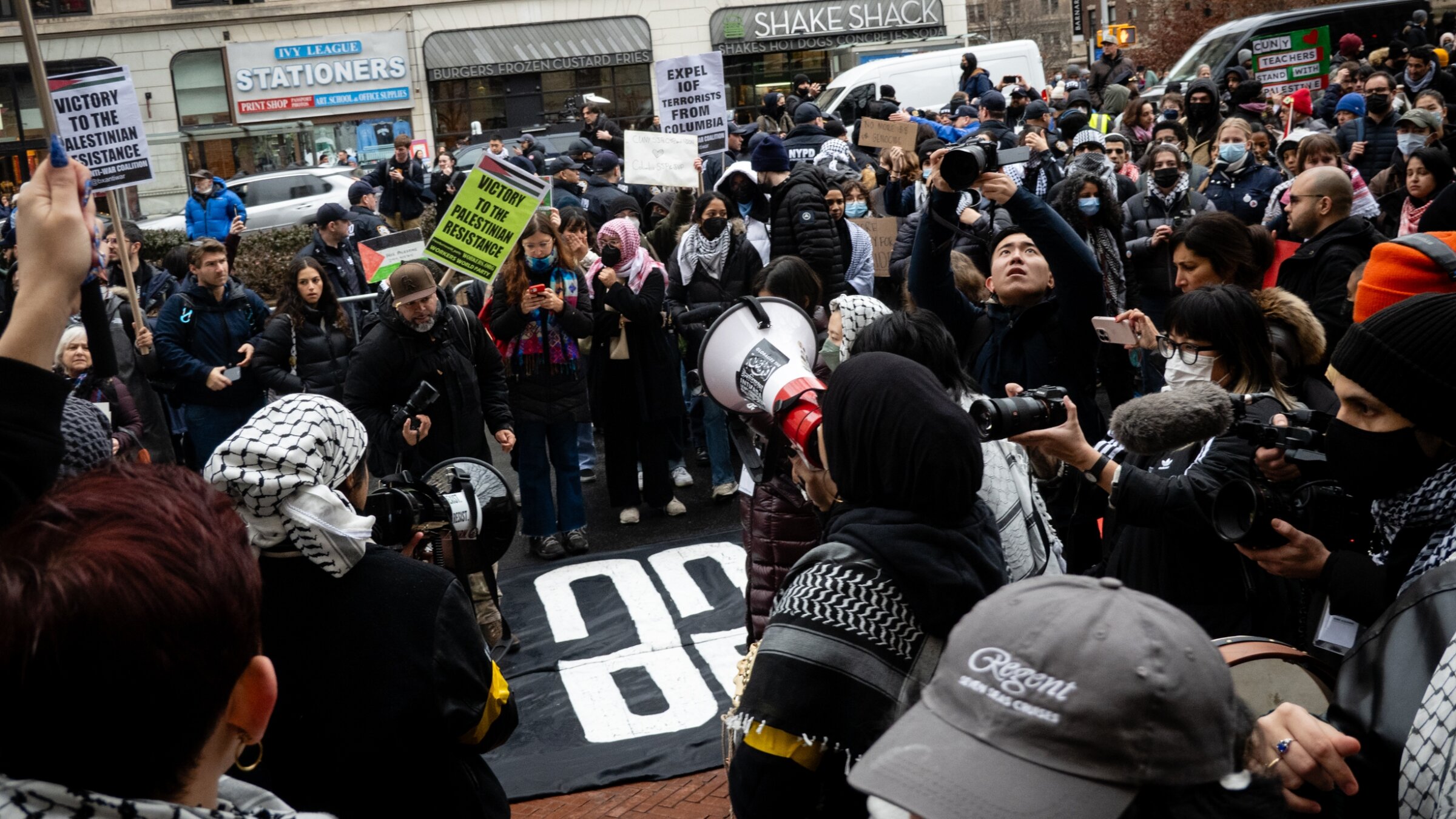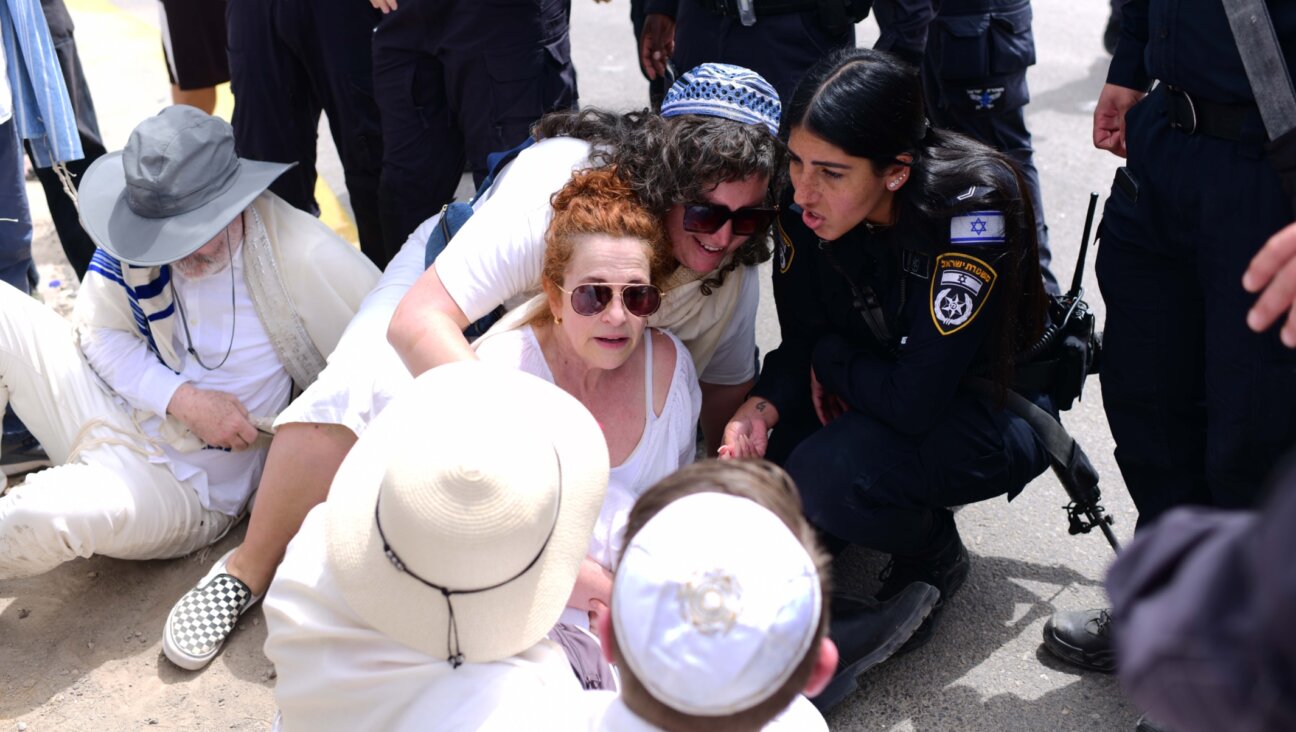Columbia investigating ‘Resistance 101’ student event where speakers praised Hamas

Pro-Palestinian activists outside Columbia University, February 2, 2024. (Luke Tress)
(New York Jewish Week) — Columbia University is investigating a student event where speakers expressed support for Palestinian terror groups and encouraged students to back “armed resistance” against Israel.
The event on Sunday, titled “Resistance 101,” was led by Columbia University Apartheid Divest, a coalition of student organizations. The two lead groups in the coalition are the school’s chapters of Students for Justice in Palestine and the anti-Zionist Jewish Voice for Peace, which have been suspended from campus for violating university protest policies.
During the event, speakers repeatedly backed Palestinian “resistance,” which in their view included open support for Hamas. One of the speakers, Khaled Barakat, a Palestinian writer and activist, referred to his “friends and brothers in Hamas, Islamic Jihad, the PFLP,” according to a video of the entire event posted on X, formerly Twitter, by user Stu Smith.
“When they see students organizing outside Palestine, they really feel that they are being backed as a resistance,” said Barakat, who is based in Canada. “Your work is so important to the resistance in Gaza.”
Other speakers at the event also backed Palestinian terror groups. Some participants attended the event in person while others spoke via videoconference. It wasn’t clear from the video how many students attended. A representative of National Students for Justice in Palestine was also at the event.
Here is my recording of the "Resistance 101” event hosted by Columbia University Apartheid Divest which features speakers from Within Our Lifetime, Masar Badil, and Samidoun.
— Stu (@thestustustudio) March 25, 2024
In a world where radicalism thrives on college campuses, I believe in radical transparency. pic.twitter.com/jRuSaY1VOq
“There is nothing wrong with being a member of Hamas, being a leader of Hamas, being a fighter in Hamas,“ said Charlotte Kates, Barakat’s wife and a coordinator for Samidoun, a pro-Palestinian activist group that was banned from Germany in November for supporting terrorism, has been sanctioned by financial companies and, according to Israel, is linked to the terror group Popular Front for the Liberation of Palestine.
Kates and Barakat are banned from entering the European Union, Samidoun said in 2022.
Kates also urged attendees to show support for “Palestinian armed resistance” at demonstrations and backed the Oct. 7 attack, which killed around 1,200 people, mostly civilians, and took more than 250 hostage. On Tuesday, a former hostage, Amit Soussana, said in a New York Times report that her captors sexually assaulted and tortured her while she was in Gaza.
“The action that the Palestinian resistance undertook on the 7th of October was an earth shattering undertaking. They actually took the necessary action and they took an action that they understood is necessary,” Kates said. She called Hamas tunnels in Gaza and weapons production a “tremendous achievement” and expressed support for Lebanon’s Hezbollah terror group and Yemen’s Houthis for targeting international shipping in the Red Sea.
“On Oct. 7 we saw the potential for a future of Palestine liberated from Zionism by the force of the resistance,” Kates said. “Oct. 7 changed the world.”
Barakat also lauded the Oct. 7 attack, using the name given to it by Hamas and saying, “It’s really important to see how the Al Aqsa Flood operation has liberated the Palestinian inner strength.”
The “Resistance 101” event came as the university has faced blowback for its approach to activism and bigotry surrounding the Israel-Hamas war. It is one of several elite colleges to face scrutiny from students, faculty, donors and government officials over its handling of antisemitism since Hamas’ Oct. 7 invasion of Israel.
The event was originally scheduled to take place at the Center for Research on Women in Barnard College, the women’s school that is part of Columbia, but had to move because it was not authorized by the university, according to a Columbia spokesperson. Organizers instead held the event in a “residence” and online, the spokesperson told the New York Jewish Week.
“We are investigating this matter and will not tolerate violations of university policy,” the spokesperson said.
It wasn’t clear where the residence was located. Nerdeen Kiswani, the founder of Within Our Lifetime, another group that sponsored the event, said during the event that she was “sitting in Columbia University.”
Within Our Lifetime and its leadership have endorsed the Oct. 7 attack on Israel and expressed support for Hamas at the frequent rallies it has staged in New York City since the attack. At the event, Kiswani backed “armed resistance” against Israel and described the Second Intifada, a mass terror wave in the early 2000s, as “armed struggle.” Kiswani said that Palestinian groups that entered peace talks in the 1990s were being “puppeted by Israel and the U.S.”
The speakers, including Kiswani, repeatedly rejected a two-state solution and criticized the Oslo Peace Accords.
“We have the right to return home and we will get that right by any means necessary,” Kiswani said, adding that she believed Palestinians had the right to “every inch of Palestine, from the river to the sea,” including cities within Israel’s internationally recognized borders such as Akko and Jaffa.
The event has drawn criticism from Israeli and U.S. officials. The Israeli embassy to the United States said on X that the event was “appalling” and that Columbia had been “hijacked by hate.”
The House Committee on Education and the Workforce, which has been investigating campus antisemitism, said on X, above a clip from the event, that “a taxpayer-supported institution’s members providing a forum to promote terrorism raises serious questions.”
Last year, the committee questioned the presidents of Harvard University, the Massachusetts Institute of Technology and University of Pennsylvania about antisemitism, and the college presidents declined to state that calls for the genocide of Jews would necessarily violate campus policies. The presidents of Harvard and UPenn resigned in the ensuing uproar.
Columbia’s president, Minouche Shafik, declined to attend the hearing, citing a previously scheduled overseas engagement. The committee opened an investigation into Columbia and summoned Shafik to another hearing scheduled for next month.
The Biden administration is also investigating Columbia, and Jewish students have filed civil lawsuits alleging discrimination on campus. Earlier this month, a report from the school’s antisemitism task force said that Jewish students were experiencing “isolation and pain.”
This article originally appeared on JTA.org.

I hope you appreciated this article. Before you go, I’d like to ask you to please support the Forward’s award-winning journalism this Passover.
In this age of misinformation, our work is needed like never before. We report on the news that matters most to American Jews, driven by truth, not ideology.
At a time when newsrooms are closing or cutting back, the Forward has removed its paywall. That means for the first time in our 126-year history, Forward journalism is free to everyone, everywhere. With an ongoing war, rising antisemitism, and a flood of disinformation that may affect the upcoming election, we believe that free and open access to Jewish journalism is imperative.
Readers like you make it all possible. Right now, we’re in the middle of our Passover Pledge Drive and we still need 300 people to step up and make a gift to sustain our trustworthy, independent journalism.
Make a gift of any size and become a Forward member today. You’ll support our mission to tell the American Jewish story fully and fairly.
— Rachel Fishman Feddersen, Publisher and CEO
Join our mission to tell the Jewish story fully and fairly.
Only 300 more gifts needed by April 30






















